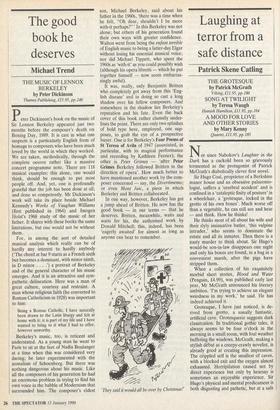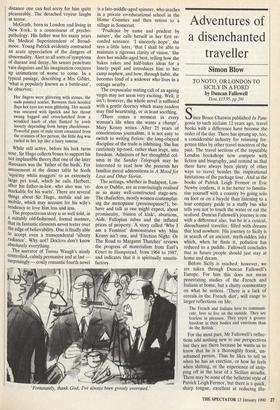Laughing at terror from a safe distance
Patrick Skene Catling
Not since Nabokov's Laughter in the Dark has a cuckold been so grievously tormented as the protagonist of Patrick McGrath's diabolically clever first novel.
Sir Hugo Coal, proprietor of a Berkshire manor house and an obsessive palaeonto- logist, suffers a 'cerebral accident' and is confined in a 'cataleptic fixity of posture' in a wheelchair, a 'grotesque, locked in the grotto of his own bones'. Much worse off than a vegetable, he can still see and hear — and think. How he thinks!
He thinks most of all about his wife and their slyly insinuative butler, 'this vulpine intruder,' who seems to dominate the estate and all its inmates. Then there is a nasty murder to think about. Sir Hugo's would-be son-in-law disappears one night and only his bones are found, in a bag in a convenient marsh, after the pigs have stripped them.
When a collection of his exquisitely morbid short stories, Blood and Water (Penguin, £4.99), was published early last year, Mr McGrath announced his literary ambition. Tin trying to achieve an elegant weirdness in my work,' he said. He has indeed achieved it.
Grotesque, I have just noticed, is de- rived from grotto, a usually fantastic, artificial cave. Grotesquerie suggests dark claustration. In traditional gothic tales, it always seems to be four o'clock in the morning in a small room, with foul weather buffeting the windows. McGrath, making a stylish debut as a creepy-crawly novelist, is already good at creating this impression. The crippled self is the smallest of caves, with a blocked exit and the oxygen almost exhausted. Horripilation caused not by direct experience but only by hearsay is sometimes an enjoyable experience. Sir Hugo's physical and mental predicament is both disgusting and pathetic, but at a safe distance one can feel sorry for him quite pleasurably. The detached voyeur laughs at terror.
McGrath, born in London and living in New York, is a connoisseur of psycho- pathology. His father was for many years the Medical Superintendent of Broad- moor. Young Patrick evidently contracted an acute appreciation of the dangers of abnormality. Alert to all sorts of symptoms of disease and decay, his senses penetrate vain disguises and his imagination conjures up intimations of worse to come. In a typical passage, describing a Mrs Giblet, `what is popularly known as a battle-axe', he observes: Her fingers were glittering with stones, the nails painted scarlet. Between their hooded flaps her eyes too were glittering. Her mouth was smeared with lipstick and her throat swung bagged and cross-hatched from a wrinkled knob of chin flanked by jowls loosely depending from lumpy cheekbones. Powerful gusts of stale scent emanated from the crannies of her person; the little dog was curled in her lap like a hairy tumour.
While still active, before his luck turns sour, Sir Hugo collects bones to support his not implausible theory that one of the later dinosaurs was the `father of the birds,'. For amusement at the dinner table he feeds `squirmy white maggots' to an extremely large pet toad, which he calls Herbert, after his father-in-law, who also was `re- markable for his warts'. There are several things about Sir Hugo, mobile and im- mobile, which may account for his wife's tendency to love him less and less.
The preposterous story is so well told, in a suitably old-fashioned, formal manner, that its fantastic elements never teeter over the edge of believability. One is finally able to accept even a transcendental 'silvery radiance'. Why not? Doctors don't know absolutely everything. The narrator of Teresa Waugh's nicely controlled, calmly persuasive and at last surprisingly — cosily romantic fourth novel is a late-middle-aged spinster, who teaches in a private co-educational school in the Home Counties and then retires to a village in Somerset.
`Prudence by name and prudent by nature', she calls herself in her first re- corded sentence. 'I sincerely hope', she says a little later, 'that I shall be able to maintain a rigorous clarity of vision.' She does her middle-aged best, telling how she bakes cakes and half-bakes ideas for a lonely pupil and introduces him to her camp nephew, and how, through habit, she becomes fond of a widower who lives in a cottage nearby.
The crepuscular mating call of an ageing virgin may not seem very exciting. Well, it isn't; however, the whole novel is suffused with a gentle decency which many readers may find heartening, or at least soothing.
`There comes a moment in every woman's life when she wants a change', Mary Kenny writes. After 25 years of conscientious journalism, it is not easy to switch to writing fiction: the long-obeyed discipline of the trade is inhibiting. She has cautiously tip-toed, rather than leapt, into freedom. Admirers of her thoughtful col- umn in the Sunday Telegraph may be interested to read how she presents her familiar moral admonitions in A Mood for Love and Other Stories.
The settings, whether in Budapest, Lon- don or Dublin, are as convincingly realised as so many well-constructed stage-sets. The characters, mostly women contemplat- ing the menopause (personopause?), be- have and talk as one might expect, about promiscuity, 'frisson of kink', abortions, Aids, Fallopian tubes and the inflated prices of property. A story called 'Why I am a Feminist' demonstrates why Miss Kenny isn't one, and 'Election Night: Or The Road to Margaret Thatcher' reviews the progress of materialism from Earl's Court to Hampstead, from 1964 to 1987, and indicates that it is spiritually unsatis- factory.
`Fortunately, thank God, I've always been grossly overrated.'











































 Previous page
Previous page